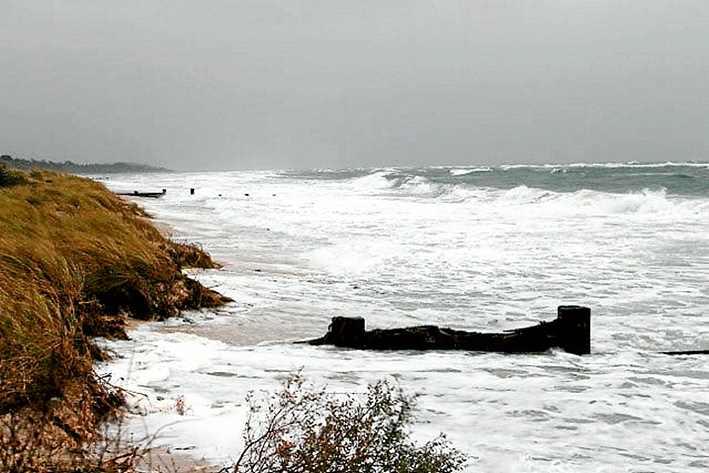
AN eroding coastline has experts and residents calling for urgent action to protect the Mornington Peninsula’s beaches and avert a costly drainage disaster.
While coastal erosion has long been a problem on the peninsula and millions of dollars being spent on mitigation works including sea walls and groynes, recent storm damage has heightened concern that not enough is being done.
Port Phillip Baykeeper Neil Blake has compelling data that suggests the increases in tide heights are substantially greater than predicted by a consultants’ reports prepared for the Port of Melbourne Corporation before the 2008-2009 channel dredging work.
He has created a simple method of recording and mapping beach profiles and water levels, and has evidence of significant erosion at Point Nepean over the past five years.
While it is recognised that beaches constantly undergo seasonal sand variations, Mr Blake says the “prevailing” view that beach sand lost along the peninsula will eventually return has resulted in the real threat being ignored.
He warns that mitigation works such as sea walls and groynes will be needed along the entire peninsula coastline, as street drainage struggles to keep up with increasing water inundation.
“The state government has already acknowledged that sea levels will rise by 800 millimetres by the end of the century, so councils and governments need to be acting now in terms of what we do with our coastline and how we develop it so not to exacerbate the problems.”
Mr Blake, who is about to begin studies at Rye and McCrae, said councils had to do more to reduce flood risks for communities along the coast.
“[The City of] Port Philip has spent thousands and has recently prepared a report on the flood risk likely to occur because of rising levels in the Elwood canal – councils have to be taking action now.”
Paul Millsom has been walking the McCrae beaches as a holiday maker, and now retiree, for 73 years, and says recent changes to the shoreline since dredging have been “mind-blowing”.
“We had a storm in September with lots of strong northerlies that left a completely flat beach with water up to the grasses and now the waves that are hitting the shoreline are causing significant damage and there’s no protection.” he said.
“If a storm like that happened again, I don’t know what we would be left with. The authorities have to stop ignoring it.”
A report released by Western Port Greenhouse Alliance in June 2008 warned of rising sea levels, coastal erosion and flooding as impacts of climate change. It noted that beaches likely to be most affected included West Rosebud, Dromana, Shore¬ham, Frankston, Balnarring and Safety Beach.
Mr Millsom said he would like to see further investigation done into erosion in McCrae and along other parts of the peninsula.
Environmentalist Jenny Warfe echoed Mr Millsom’s concern for the coast. Ms Warfe, who headed environmental group Blue Wedges’ challenge to channel deepening in 2008, said north winds and high seas, combined with changes brought on by dredging, was causing inevitable changes to the beaches.
“A major point I made during our campaign against the channel dredging project was that it would increase water levels in the bay (and) even the Port of Melbourne Corporation and state government conceded there would be a small increase in tide heights,” she said.
“The additional water in the bay since dredging also adds to the weight of water hitting the coast during storms. When an incoming tide and a storm event coincide you have a perfect conditions for coastal erosion.”
Ms Warfe said it was recognised by scientific studies that increased sea levels from channel deepening, combined with global warming, produced unpredictable coastal changes.
“We argued it would be irresponsible for government to add to the already known risks of global warming induced sea-level rise, exposing the coast to greater erosion risks and exposing taxpayers and ratepayers to ongoing costs of shoring up the coastline – Portsea being the most compelling example of post dredging confluence of impacts.
“Now we have to live with the consequences.”
Mornington Peninsula Shire’s communications and media manager Mark Kestigian said the council was not aware of recent erosion at McCrae.
He said the shire’s role was to manage risk with appropriate reporting, signs and fencing.